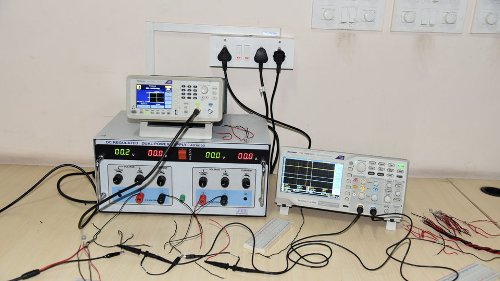Introduction
“Electronics and Communication Engineering” is one of the fastest growing field of engineering courses. It involves the transmission of information across the channel.
Electronics and Communication Engineering (ECE) compiles in Communication Engineering and core Electronics Engineering. The course concept is to focus mainly on the communication part with the knowledge of the electronics field.
“Electronics and Communication Engineering deals with the electronic devices and software applications. It is an interface of chip level hardware and information technology”.
One question always rises in the mind!
What is the difference between electrical engineering and electronics engineering fields?
Not too much.
The basic study of ECE is just as the electronics engineering, and communication engineering is an additional field in electronics engineering.
The history of electronics engineering is too ancient but it comes in race with the invention of Radio and Telegraph. At that time the Electronics and Communication Engineering was known as the Radio Engineering.
The Electronics and communication Engineering has been emerged in around 1950s.
Course & Duration
Electronics and communication engineering is an emerging field of engineering.
In first half of the course, the students go through the basic engineering concept, physics, mathematics and chemistry. In the second half of the course, the students go through the core study of communication such as design, digital electronics, fundamental of Electronics engineering, signal & circuit, electronic circuits, VLSI, power electronics, computer architecture, and control systems.
After completion of UG degree the students are designated as the Bachelor of Engineering or Bachelor of Technology, depending on the University.
A bachelor degree usually covers the mathematics, physics, and computer science.
You can choose the Electronics and Communication Engineering, after completed 12th examination with mathematics and science.
The academic criterion of Electronics and Communication Engineering is divided into three courses/programmes as follows:
Diploma courses leading to the polytechnic diploma of 3 years duration. (after 10th or 12th)
UG courses leading to the B.Tech (Bachelor of Technology) degree of 4 years duration. (after 12th)
PG courses leading to the M.Tech (Master of Technology) degree of 2 years duration. (after graduation)
Beside these, it is one of the broad research fields leading to the PhD (Doctor of Philosophy) degree.
For entering in PG (M.Tech/M.E/M.S) programme, B.Tech in Electrical Engineering is must.
Some other courses in this field are listed here:
- Diploma in Electronics and Communication Engineering
- Bachelor of Technology (B.Tech) in Electronics Engineering
- Bachelor of Technology (B.Tech) in Electronics & Communication Engineering
- Master of Technology (M.Tech) in Electronics Engineering
- Master of Technology (M.Tech) in Electronics & Communication Engineering
- Doctor of Philosophy (Ph.D) in Electronics and Communications Engineering
Specialization (Sub-disciplines)
Electronics and Communication Engineering has expanded in various specializations as the following.
- Signal Processing
- Telecommunications Engineering
- Control Engineering
- Instrumentation Engineering
- Computer Engineering
- VLSI design Engineering
Admission Criteria
How to get admission in Electronics and Communications Engineering courses?
You can get admissions into these courses, through entrance examinations which are organized at national, state and university level. Admissions are also done on the basis of merit list. The merit list will be drawn on the basis of marks scored in the qualifying examinations.
For admissions into UG courses, you may appear for the JEE Main examination. It is a national level exam conducted for admissions into various UG engineering courses offered across the country. For admissions into PG course, you can appear in the GATE exam.
Some engineering entrance exams are given here:
- JEE Main 2022
- JEE Advanced 2022
- GATE 2022 (Graduate Aptitude Test for Engineering)
- BCECE 2022 (Bihar Combined Entrance Competitive Examination)
- UPSEE 2022 (Uttar Pradesh State Entrance Examination)
- AP EAMCET 2022 (Andhra Pradesh Engineering, Agriculture & Medical Common Entrance Test)
Which are the best colleges for admissions into these courses?
- Indian Institute of Technology (IIT), Roorkee
- Indian Institute of Technology (IIT), Guwahati
- National Institute of Technology (NITK), Surathkal
- National Institute of Technology (NIT), Warangal
- Indian School of Mines (ISM), Dhanbad
- National Institute of Technology (NIT), Trichy
Jobs & Career
This field has an opportunity in two types of companies, Telecom Industries and Software Industries.
An electronics and communication engineer can work in aviation and avionics, consumer electronics, electricity plant, manufacturing, transportation, communication & telecommunication, computer application, radio & television, diagnostic equipment manufacturing and offshore companies.
There is an opportunity to get a central government job, state government job and in public & private sectors.
What will be your Job Profile?
Some job titles are listed here:
- Electronics Engineer
- Field Test Engineer
- Network Planning Engineer
- Electronics and Communications Consultant
- Customer Support Engineer
- Electronics Technician
- Associate Firstline Technician
- Research and Development Software Engineer
- Service Engineer
- Senior Sales Manager
- Technical Director
Here are some reputed firms which require the electronics and communication engineers whenever:
- BEL
- DMRC
- Siemens
- Texas Instruments
- Intel
- nVIDIA
- Philips Electronics
- Motorola
- Samsung
- Conexant and Flextronics
- DRDO
- ISRO
- Infosys
- TCS
- Wipro
- Accenture
- HCL Technologies
- Tech Mahindra
Salary
An electronics engineer has a scope of career in India and Abroad. Salary packages offered to electronics engineers vary upon various factors such as working skills, qualifications, working area, recruiters and many other terms.
If you are an electronics engineer, you can get the initial package of 3.5-4.5 lakh per annum in India and $60000 to 70000 per annum in abroad. After gaining enough experience, you can easily earn attractive salary packages in this field.







